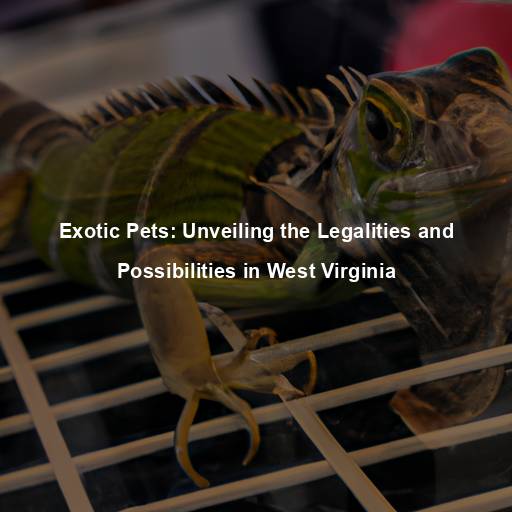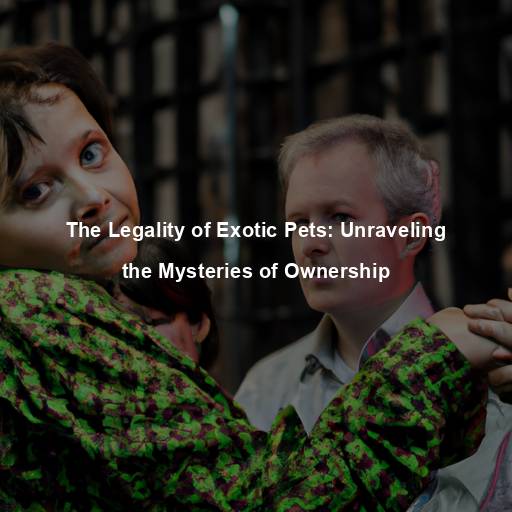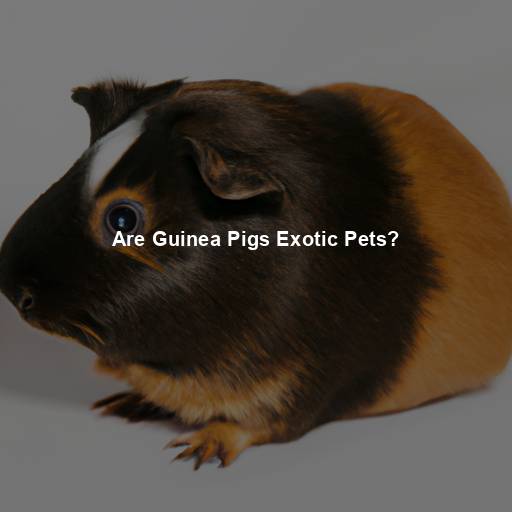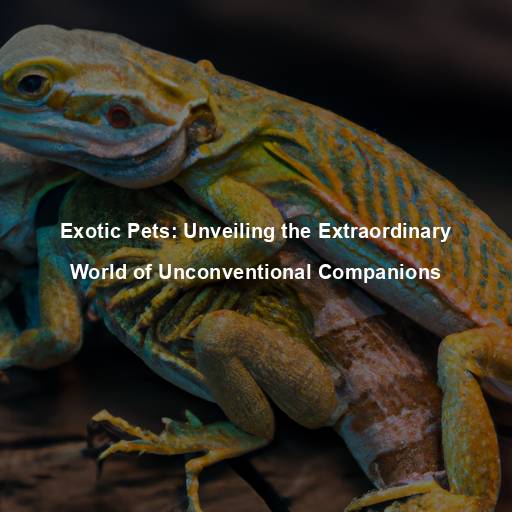Exotic Pets: Unveiling the Legalities and Possibilities in West Virginia
Last Updated on November 2, 2023 by Evan
Contents [hide]
- 1 Understanding the Fascination with Exotic Pets
- 1.1 Exploring the Legal Landscape in West Virginia
- 1.2 Research and Preparation: The Key to Responsible Ownership
- 1.3 Legal Exotic Pets in West Virginia
- 1.4 Restricted Exotic Pets in West Virginia
- 1.5 The Importance of Ethical Exotic Pet Ownership
- 1.6 Consulting the Experts: Pet-Specific Associations and Veterinarians
- 1.7 Dietary Considerations
- 1.8 Environmental Conditions
- 1.9 Exercise and Enrichment
- 1.10 Health and Veterinary Care
- 1.11 Responsible Acquisition and Legalities
- 1.12 Education and Continuous Learning
- 2 FAQs: What Exotic Pets are Legal in West Virginia
- 2.1 What is considered an exotic pet in West Virginia?
- 2.2 Are there any restrictions on owning exotic pets in West Virginia?
- 2.3 What exotic pets are legal to own without a permit in West Virginia?
- 2.4 What exotic pets require a permit to own in West Virginia?
- 2.5 How can I obtain a permit to own an exotic pet in West Virginia?
- 2.6 Can I release an exotic pet into the wild if I can no longer care for it in West Virginia?
- 2.7 Are there any educational or experience requirements for owning exotic pets in West Virginia?
- 2.8 Do local cities or counties in West Virginia have additional laws on owning exotic pets?
Understanding the Fascination with Exotic Pets
Exotic pets have long captivated the imaginations of animal lovers around the world. From majestic big cats to colorful reptiles, the allure of owning a unique and extraordinary creature as a companion can be incredibly enticing. However, before embarking on the journey of acquiring an exotic pet, it is crucial to be well-informed about the legalities surrounding these animals. In this article, we will delve into the topic of exotic pets in West Virginia, exploring what types are legal and the considerations one must take into account.
Exploring the Legal Landscape in West Virginia
When it comes to owning exotic pets, each state in the United States has its own set of regulations and restrictions. West Virginia is no exception. The state has specific laws in place to ensure the welfare and safety of both the animals and their owners. Understanding these regulations is essential for anyone considering an exotic pet.
Research and Preparation: The Key to Responsible Ownership
Considering the allure of owning an exotic pet, it becomes crucial for enthusiasts to embrace the enigmatic journey of research and familiarization. Each captivating creature has distinct demands, spanning from their selective palate to the intricate intricacies of their surroundings. Delving into these beguiling prerequisites ensures that prospective caretakers unlock the door to a harmonious habitation, where their extraordinary companion can flourish in optimal conditions.
Legal Exotic Pets in West Virginia
While there are certain restrictions on exotic pet ownership in West Virginia, the state allows for the possession of several fascinating creatures. Let’s explore some of the legal exotic pets in West Virginia:
Hedgehogs
Hedgehogs have gained popularity as exotic pets due to their adorable appearance and low maintenance requirements. In West Virginia, hedgehogs are legal to own as pets without any special permits. These nocturnal creatures can make delightful companions for individuals seeking a unique pet experience.
Sugar Gliders
Have you ever heard of sugar gliders? These adorable little creatures possess a unique talent for gliding through the air, captivating the hearts of many. Astonishingly, owning a sugar glider in West Virginia is perfectly legal, but there’s a catch – it must be obtained from a lawful source, ensuring their well-being isn’t jeopardized by their origins. Although they may seem like low-maintenance pets, sugar gliders are actually quite demanding, craving social interaction, a well-rounded diet, and sufficient room to stretch their tiny wings.
Ball Pythons
Reptile enthusiasts can find solace in the fact that ball pythons are legal to own in West Virginia. These beautiful snakes are relatively small in size and have a docile temperament, making them popular choices among snake enthusiasts. However, it is crucial to note that the ownership of venomous snakes is strictly prohibited in the state.
Tarantulas
Welcome to the mesmerizing world of arachnids! Did you know that in West Virginia, you can actually own your very own tarantula? These enigmatic eight-legged creatures are sure to captivate your senses as you observe and care for them. However, it’s crucial to fully comprehend their unique requirements and the potential hazards that come with handling them.
Restricted Exotic Pets in West Virginia
West Virginia has taken a proactive approach to exotic pet ownership, implementing regulations to ensure the well-being of both its residents and wildlife. While enthusiasts may still enjoy the companionship of certain unique creatures, it is crucial to familiarize oneself with the state’s list of prohibited animals. This comprehensive measure aims to strike a delicate balance between preserving public safety and protecting the integrity of West Virginia’s ecosystem, preventing any untoward consequences from the introduction of potentially invasive species. From reptiles to mammals, the restricted exotic pets in West Virginia encompass a captivating array of species.
Primates
Owning primates in West Virginia can be quite challenging, as these intelligent creatures have intricate social and environmental requirements that are not easily met in domestic settings. Unfortunately, due to the potential transmission of diseases, it is generally not permitted for residents to keep monkeys and apes as pets. The complex nature of these fascinating animals, coupled with the risks involved, introduces a level of perplexity and dilemmas when it comes to primate ownership in the state.
Large Cats
As with many states, West Virginia prohibits the ownership of large cats, such as lions, tigers, and leopards, as pets. These animals require extensive space, specialized care, and possess inherent dangers that make them unsuitable for private ownership.
Venomous Snakes
For the safety and well-being of all, it is crucial to note that West Virginia has implemented a strict prohibition on the possession of venomous snakes. The inherent dangers associated with mishandling or accidental venom release cannot be taken lightly. Ensuring the harmony of our ecosystem and safeguarding lives remains paramount in such matters.
The Importance of Ethical Exotic Pet Ownership
In the vibrant state of West Virginia, the ownership of exotic pets may indeed be permitted by law. However, let us not forget the paramount importance of upholding the highest standards of animal welfare. These extraordinary creatures harbor unique needs that must be diligently attended to in order to safeguard their overall well-being, both physically and mentally. With a commitment to responsible ownership, it becomes imperative to provide these majestic beings with suitable habitats, nourishment that caters to their distinct dietary requirements, access to expert veterinary care, and an environment that stimulates their intricate minds.
Consulting the Experts: Pet-Specific Associations and Veterinarians
To ensure the best possible care for an exotic pet, it is highly recommended to seek guidance from specialized associations and experienced veterinarians. These professionals possess the knowledge and expertise necessary to provide accurate information and support throughout the journey of exotic pet ownership.
Dietary Considerations
Each exotic pet species has its own dietary preferences and nutritional requirements. It is crucial for owners to research and provide a balanced diet that meets these needs. For example:
For hedgehogs to thrive, their dietary needs encompass a delicate balance of nourishing elements. A carefully constructed menu, comprising of premium cat food, a medley of insects, and a sprinkle of fruits, is vital to ensure their well-being reaches its peak. Embracing this mosaic of nutrients, these captivating creatures embark on a journey towards optimal health while unveiling the intricacies of their complex dietary preferences. Dive into the world of hedgehog nutrition, where a harmonious blend of feline sustenance, creeping critters, and nature’s succulent offerings unlock the secrets to their perplexingly vibrant existence.
When it comes to nourishing these adorable creatures known as sugar gliders, their dietary needs are quite diverse. A vibrant mix of fresh fruits, crisp vegetables, protein-rich delicacies, and specialized sugar glider pellets form the cornerstone of their menu. Dear sugar glider owners, feast upon this guide to ensure your beloved companions receive the nutrition they deserve!
– Ball pythons are carnivorous and primarily consume small mammals, such as mice or rats, that have been appropriately thawed and prepared.
Environmental Conditions
Ensuring the optimal environment for exotic pets is crucial for their overall health and happiness. Factors like temperature, humidity, lighting, and ample space are pivotal in creating a habitat that meets their specific needs. To provide the best care, it is essential to consider these key points carefully.
Providing a comfortable habitat for hedgehogs requires careful consideration of key environmental factors. Ensuring a well-ventilated enclosure with a temperature range of 72-80°F (22-27°C) and maintaining a humidity level around 40-60% is crucial to their well-being. Understanding these parameters fosters an environment that promotes their overall health, but navigating these variables can sometimes leave owners puzzled.
– Sugar gliders thrive in large, multilevel enclosures that mimic their natural tree-dwelling habitats. They require a consistent temperature of around 75-85°F (24-29°C) and a humidity level of 50-70%.
– Ball pythons require a secure and appropriately sized terrarium with a temperature gradient ranging from 75-85°F (24-29°C) on the warm side and 70-75°F (21-24°C) on the cool side. They also need a humidity level of 50-60%.
Exercise and Enrichment
When it comes to our extraordinary companions, let’s not forget that they crave both physical exertion and intellectual engagement, just like any other creature. To ensure their optimal state of being, let’s indulge them in playful adventures, exciting explorations, and rewarding social encounters. Here are a few valuable suggestions:
Did you know that hedgehogs can experience the wonders of outdoor exercise too? It’s true! These adorable spiky creatures can have a blast while being supervised in a protected and secure space. Engaging their inquisitive nature, you can enhance their experience by offering an array of engaging toys and fascinating tunnels.
Sugar gliders, those energetic little creatures, thrive in environments that offer them plenty of room to jump, climb, and venture into the unknown. For devoted owners, preparing a special play zone where their tiny companions can engage in safe and stimulating interactions is essential. By providing such an environment, sugar glider enthusiasts can ensure their pets’ well-being and allow them to revel in the excitement of their surroundings.
– Ball pythons, although less active than mammals, benefit from regular handling and environmental enrichment. This can include providing hiding spots, branches for climbing, and objects to explore within their enclosure.
Health and Veterinary Care
Maintaining the health of an exotic pet requires regular veterinary check-ups and close monitoring of their physical and behavioral well-being. It is crucial to establish a relationship with a veterinarian experienced in exotic pet care. Some important considerations include:
Keeping your hedgehog healthy is no easy task! It’s crucial to schedule those annual wellness examinations to catch any hidden health problems before they become a prickly predicament. Don’t forget about those tiny paws and teeth either – regular nail trims and dental checks are imperative to maintain your spiky companion’s overall well-being. Stay on top of your hedgehog’s care routine, and you’ll be sure to have a happy and contented pet!
Regular dental check-ups and routine examinations are essential for sugar gliders to maintain their oral health at its peak. Ensuring their dental well-being is upheld through these measures is key to providing them with the best care possible.
Ensuring the well-being of your beloved ball python is no small feat. Regularly scheduled health check-ups are a must, especially during the early stages of ownership, to unveil any lurking health issues. Keep a keen eye on their shedding patterns, appetite fluctuations, and general behavior, as these telltale signs can reveal more than meets the eye. Rest assured, with proper care and vigilance, your scaly companion will slither through life in the pink of health.
Responsible Acquisition and Legalities
Before bringing an exotic pet into their home, prospective owners must ensure they are acquiring them through legal and ethical means. This includes:
- Researching reputable breeders or licensed exotic pet dealers who adhere to ethical breeding practices and provide proper care for their animals.
- Avoiding the illegal wildlife trade, which poses threats to endangered species and contributes to animal suffering.
Aspiring exotic pet owners find themselves immersed in a whirlwind of legal intricacies, navigating the maze of local, state, and federal statutes governing the ownership of these extraordinary creatures. Their ultimate objective? To seamlessly adhere to regulations and secure the permits and licenses required to embark on their unique ownership journey. The process, filled with twists and turns, demands a keen eye for detail and an unwavering commitment to compliance, leaving even the most seasoned enthusiasts in a state of perplexity.
Education and Continuous Learning
Owning an exotic pet is like embarking on a wild adventure that never ceases to surprise and challenge. To successfully navigate this exotic realm, one must be forever thirsty for knowledge, forever open to learning, and forever adapting to the ever-evolving landscape of information. Whether it’s staying up-to-date on groundbreaking research, discovering the intricacies of specialized veterinary care, or mastering the art of husbandry tailored to their unique exotic companion, responsible owners must embrace the perpetual pursuit of expertise. By embracing this perpetual state of curiosity, one can ensure a thriving and extraordinary journey in the world of exotic pet ownership.
Engaging in online communities, forums, or social media groups that cater to the nurturing and protection of unique and extraordinary pets can be an incredibly enriching experience. These virtual spaces provide a remarkable avenue for individuals to connect with like-minded enthusiasts, who are equally fascinated by the art of tending to exotic animals. By becoming an active member of these communities, one can uncover a trove of wisdom, anecdotes, and valuable insights shared by passionate pet owners who have embarked on a captivating journey with their unconventional companions. This virtual camaraderie and exchange of knowledge creates an inclusive and empowering environment for those who find solace in the realm of extraordinary pet care.
– Attending educational seminars, workshops, or conferences organized by reputable exotic pet associations.
Finding reliable sources for accurate and current information on how to take care of your exotic pets can be a perplexing task. From subscribing to reputable publications to exploring recommended websites, the options can seem overwhelming. But fear not, because we’ve got you covered! Let us guide you through the maze of information, ensuring that you have access to the most reliable sources for the well-being of your beloved exotic companions.
FAQs: What Exotic Pets are Legal in West Virginia
What is considered an exotic pet in West Virginia?
In the wild and wonderful state of West Virginia, there exists a fascinating world of unconventional companionship. Exotic pets, these captivating creatures originating from faraway lands, have found themselves nestled amidst the hills and valleys of this Appalachian haven. From the slithering reptiles to the vibrant birds, pelage-clad mammals to the enigmatic invertebrates, these non-native species bring an air of intrigue and wonder to the pet-loving enthusiasts of the region. Explore the unconventional, tread on uncharted territories, and embark upon a journey into the extraordinary as we unravel the untold stories of these non-commonplace companions.
Are there any restrictions on owning exotic pets in West Virginia?
Owning exotic pets in West Virginia comes with its fair share of restrictions, adding an extra layer of complexity to the process. The state has meticulously laid out regulations and permits that are mandatory for individuals interested in keeping certain exotic animals as pets. Therefore, it is crucial to embark on a comprehensive journey of research and familiarization with these restrictions before even contemplating the idea of owning an exotic pet.
What exotic pets are legal to own without a permit in West Virginia?
In the wild and wonderful state of West Virginia, the kingdom of curious creatures, an intriguing phenomenon allows intrepid souls to venture into the realm of exotic pets. However, tread cautiously, for the list of peculiar companions, requiring no official blessing, is a peculiar concoction of joy and perplexity. From the mesmerizing world of aquatic beings to the enchanting songs of feathered friends, one can chirp alongside birds of ordinary nature, as long as the endangered sparkles are left untarnished. For those seeking the embrace of furry spirits, the whimsical realm permits domesticated ferrets, rabbits, and rodents, keeping the kingdom alive with vibrant bursts of life. Yet, in the convoluted maze of regulations, the enigmatic banishment of prairie dogs leaves the soul questioning the logic behind this bewildering decree. Amidst this complex tapestry, the alluring presence of non-venomous reptiles snake their way into the hearts of the daring, shedding light on the curious allure of this peculiar paradise.
What exotic pets require a permit to own in West Virginia?
In the enchanted realm of West Virginia, a mystical land where the whispers of exotic creatures echo through the mist, a peculiar regulation exists. It is said that those who seek to hold within their grasp the forbidden allure of non-native venomous snakes, mighty constrictors, and even creatures of the feline kingdom must acquire a permit from the illustrious West Virginia Division of Natural Resources. This arcane authorization bestows upon its bearer the power to tread upon the path of ownership for these mesmerizing beings, whether they be slithering serpents or untamed carnivores. It is a journey that weaves through enigmas, unveiling the perplexing world of exotic fauna that lies beyond our wildest dreams.
How can I obtain a permit to own an exotic pet in West Virginia?
To obtain a permit for owning an exotic pet in West Virginia, you must contact the West Virginia Division of Natural Resources. They will provide you with all the necessary information, requirements, and application procedures. It is vital to ensure that you meet all the criteria set forth by the state before applying for a permit.
Can I release an exotic pet into the wild if I can no longer care for it in West Virginia?
It’s crucial to understand the legal and ethical implications of releasing an exotic pet into the wild in West Virginia – it’s a big no-no. Not only does this pose a threat to local ecosystems and wildlife populations, but it can also have unforeseen consequences for public health. Instead, if you find yourself unable to care for your exotic pet, I strongly encourage you to explore responsible alternatives such as reaching out to animal shelters, rescues, or seeking guidance from authorities on the best course of action.
Are there any educational or experience requirements for owning exotic pets in West Virginia?
In West Virginia, the criteria for owning exotic pets remain undefined at present, leaving aspiring pet owners in a state of bewilderment. However, it is strongly advised to possess an intricate knowledge of the intricate dynamics, peculiar needs, and possible hazards tied to the exotic species that captivate your fancy. To gain insight, enthusiasts can seek wisdom from seasoned owners, confer with veterinarians well-versed in the realm of exotic animals, and embark on a profound quest for knowledge through extensive research. By embracing these indispensable measures, one can guarantee the utmost care and welfare for their unconventional companions.
Do local cities or counties in West Virginia have additional laws on owning exotic pets?
Yes, it is important to note that some local cities or counties in West Virginia may have additional laws or regulations regarding owning exotic pets. It is crucial to check with the local authorities or animal control departments in your specific area to ensure full compliance with any additional rules and restrictions that may be in place.







